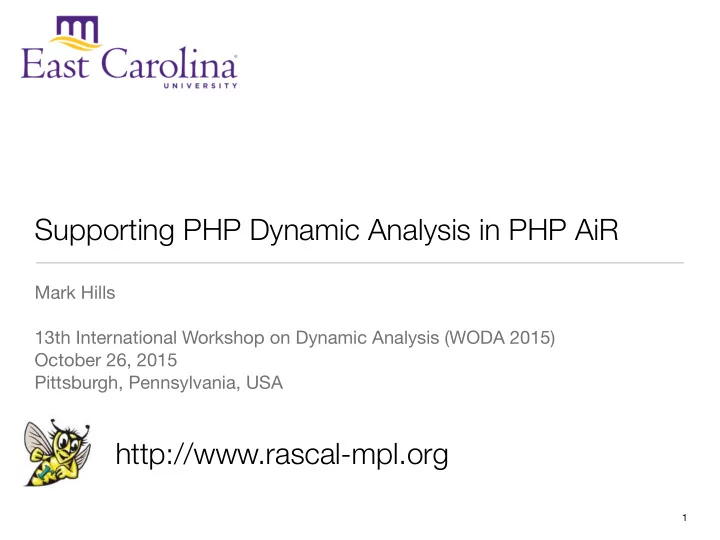

Supporting PHP Dynamic Analysis in PHP AiR Mark Hills 13th International Workshop on Dynamic Analysis (WODA 2015) October 26, 2015 Pittsburgh, Pennsylvania, USA http://www.rascal-mpl.org 1
PHP AiR: PHP Analysis in Rascal • PHP AiR: a framework for PHP source code analysis • Domains: • Program analysis (static/dynamic) • Software metrics • Empirical software engineering 2
PHP AiR: PHP Analysis in Rascal • PHP AiR: a framework for PHP source code analysis • Domains: • Program analysis ( static /dynamic) • Software metrics • Empirical software engineering 3
PHP AiR: PHP Analysis in Rascal • PHP AiR: a framework for PHP source code analysis • Domains: • Program analysis (static/ dynamic ) • Software metrics • Empirical software engineering 4
A quick note on Rascal • “Rascal is a domain specific language for source code analysis and manipulation a.k.a. meta-programming.” (http://www.rascal- mpl.org/) • Language focus: program analysis , program transformation, domain-specific language creation • Current projects across large numbers of domains, both outside and within academia (including this one!) • Open source, committers worldwide 5
Original motivation: dynamic invocations • Reflective capability in PHP for invoking functions and methods • Runtime target given as PHP callable , not as regular identifier • Function name • Object instance and method name • Class name and method name • Closures (in newer versions, not common yet) • Parameters passed as var-args or as array 6
Dynamic invocations: two quick examples // From MediaWiki 1.19.1 if ($this->mPage->getID() != $this->mRev->getPage()) { $fun = array(get_class($this->mPage),'newFromID'); $this->mPage = call_user_func($fun, $this->mRev->getPage()); } // From WordPress 3.4 $args = wp_list_widget_controls_dynamic_sidebar( array(0 => $args, 1 => $widget['params'][0])); call_user_func_array('wp_widget_control', $args); 7
What are they used for? Why study them? • Often used for plugin systems and user extensions • Presence makes it hard to analyze the program • How do we build a call graph? • How do we compute types? aliases? taint? • Indirection also slows execution (observational, no figures yet) • Not uncommon, so cannot just ignore: 94 in WordPress 3.4, 149 in MediaWiki 1.19.1 (see our ISSTA 2013 paper for details) 8
Possible solution: code specialization • Idea based on work by Furr, An, and Foster: Profile-Guided Static Typing for Dynamic Scripting Languages (OOPSLA 2009) • Trace executions of system, execute using test scripts • Replace dynamic features with static variants and “catch-all” • Original work used Ruby, Mulder applied technique to PHP and WordPress (see thesis Reducing Dynamic Feature Usage in PHP Code ) • Results installation-specific, based on specific plugins used 9
Why not just use the existing solution? • Earlier work had a complex tool chain, hard to set up and reuse • Very scenario-specific, targeted specifically at dynamic invocations, we need a generic tracing framework • No support for figuring out where strings come from, useful for analysis and empirical studies 10
Supporting dynamic analysis in PHP AiR • Now: Support function trace analysis directly in PHP AiR • Flexible parsing and filtering capabilities • Directly in Rascal, easy to extend, share, replicate • Future: support execution of tests from within Rascal • Initial support for driving xdebug exists, needs further work • Early stage: Instrument interpreter to track origins of strings 11
Function trace analysis in action: PHP defines • First, generate trace/traces (currently outside of PHP AiR) • Parsing, stage 1: Read in line from trace file, determine the record type, apply initial filtering • Parsing, stage 2: parse function parameters, apply additional filtering • Major bottleneck is speed of parser • Further challenge: location information in not precise, line-based 12
String origins • Based on origin tracking (van Deursen, Klint, and Tip) and string origins (Inostroza, van der Storm, and Erdweg) • Goal: figure out where strings come from, track transformations of strings through program execution • Origins tracked using source locations of literals, info on external inputs, transformation functions; origin types based on how string is created • Still very early in implementation 13
String origins: challenges • PHPs main goal in life: generate strings • String-handling code is often optimized, we need to undo this • Looking into HHVM, changes may be less disruptive, Quercus may be an implementation dead-end (supports PHP 5.4, nothing newer) • Also looking into K, instrument existing PHP semantics (e.g., An Executable Formal Semantics of PHP by Filaretti & Ma ff eis, ECOOP 2014), simplicity of interpreter may allow us to be more precise 14
Summary • Dynamic analysis for PHP is needed to properly analyze and study dynamic language features • We are extending PHP AiR to enable flexible dynamic analysis for PHP • Trace parsing and filtering works well, adapting to handle undocumented xdebug outputs • String origins work is still ongoing, reevaluating choice of platform, looking for interested students 15
Discussion Thank you! Any Questions? • Rascal: http://www.rascal-mpl.org • Me: http://www.cs.ecu.edu/hillsma 16
Recommend
More recommend